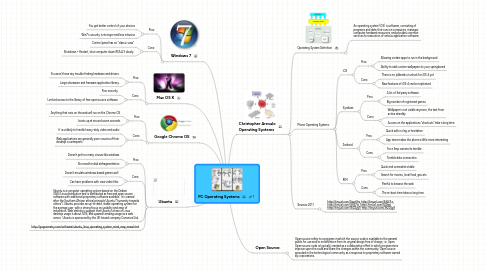
1. Windows 7
1.1. Pros:
1.1.1. You get better control of your devices
1.1.2. Win7's security is stronger and less intrusive
1.2. Cons:
1.2.1. Control panel has no "classic view"
1.2.2. Shutdown + Restart, shut computer down REALLY slowly.
2. Mac OS X
2.1. Pros:
2.1.1. You won’t have any trouble finding hardware and drivers.
2.1.2. Large shareware and freeware application library.
2.2. Cons:
2.2.1. Poor security.
2.2.2. Limited access to the library of free open source software.
3. Google Chrome OS
3.1. Pros:
3.1.1. Anything that runs on the web will run on the Chrome OS
3.1.2. boots up at around seven seconds
3.2. Cons:
3.2.1. It is unlikely to handle heavy-duty video and audio
3.2.2. Web applications are generally poor cousins of their desktop counterparts
4. Ubuntu
4.1. Pros:
4.1.1. Doesn't get too many viruses like windows
4.1.2. No need for disk defragmentation
4.2. Cons:
4.2.1. Doesn't emulate windows based games well
4.2.2. Can have problems with view video files
4.3. Ubuntu is a computer operating system based on the Debian GNU/Linux distribution and is distributed as free and open source software with additional proprietary software available. It is named after the Southern African ethical principle Ubuntu ("humanity towards others"). Ubuntu provides an up-to-date, stable operating system for the average user, with a strong focus on usability and ease of installation. Web statistics suggest that Ubuntu's share of Linux desktop usage is about 50%, and upward trending usage as a web server. Ubuntu is sponsored by the UK-based company Canonical Ltd.
4.4. http://gogeometry.com/software/ubuntu_linux_operating_system_mind_map_news.html
5. Christopher Arevalo Operating Systems
5.1. Operating System Definition
5.1.1. An operating system (OS) is software, consisting of programs and data, that runs on computers, manages computer hardware resources, and provides common services for execution of various application software.
5.2. Phone Operating Systems
5.2.1. iOS
5.2.1.1. Pros:
5.2.1.1.1. Allowing certain apps to run in the background
5.2.1.1.2. Ability to add custom wallpapers to your springboard
5.2.1.2. Cons:
5.2.1.2.1. There is no jailbreak or unlock for iOS 4 yet
5.2.1.2.2. New features of iOS 4 can be replicated
5.2.2. Symbian
5.2.2.1. Pros:
5.2.2.1.1. A lot of 3rd party software
5.2.2.1.2. Big number of registered games
5.2.2.2. Cons:
5.2.2.2.1. Wallpaper is not visible anymore, the text from active standby
5.2.2.2.2. Access on the applications "shortcuts" take a long time
5.2.3. Android
5.2.3.1. Pros:
5.2.3.1.1. Quick with no lag or hesitation
5.2.3.1.2. App store makes the phone a little more interesting
5.2.3.2. Cons:
5.2.3.2.1. For a 3mp camera its terrible
5.2.3.2.2. Terrible data connection
5.2.4. RIM
5.2.4.1. Pros:
5.2.4.1.1. Quick and somewhat stable
5.2.4.1.2. Search for movies, local food, gas..etc
5.2.4.2. Cons:
5.2.4.2.1. Painful to browse the web
5.2.4.2.2. The re-boot time takes a long time
5.3. Sources 2011
5.3.1. http://tinyurl.com/5wot9rz, http://tinyurl.com/3j667tc, http://tinyurl.com/3j667tc, http://tinyurl.com/5j4tep, http://tinyurl.com/3h22yg9, http://tinyurl.com/3h22yg9
